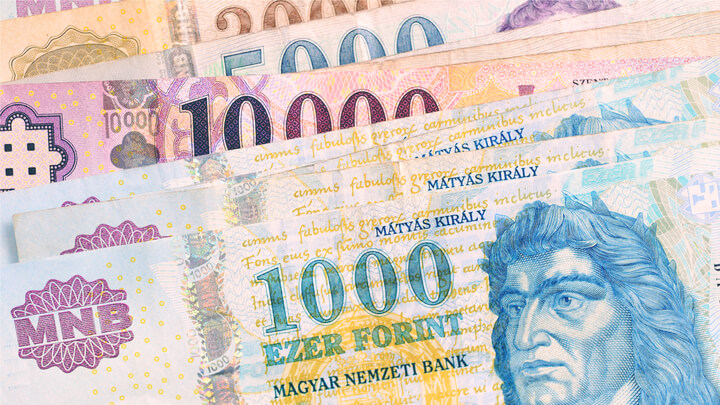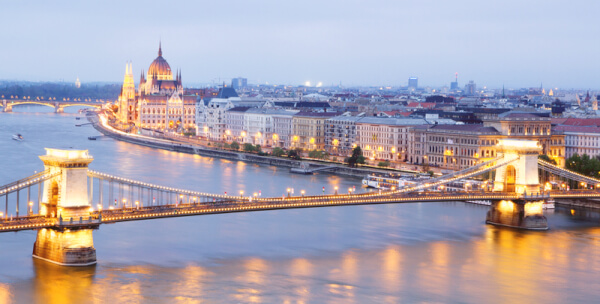ATMs in Hungary: Credit cards and fees
Whether you’re looking for charming architecture, a thriving nightlife, stunning natural scenery or world-class wine country, Hungary is the place to go. This...

If you plan to live, work, or invest in Hungary, or if you’re just going to visit, you’ll want to know the basics on spending.
In this financial guide to Hungary, you’ll find everything you need to know about Hungary’s currency, banking institutions, and how to make the most of your money.
Though Hungary is a member of the European Union (EU), Hungary’s official currency is the Hungarian Forint. The Hungarian government hopes to replace forints entirely with the Euro, but this probably won’t happen until the 2020s.
| Symbols | The symbol for the forint is Ft and its code is HUF. |
|---|---|
| 1 HUF | The forint is divided into 100 filler. |
| HUF coins | Filler coins are no longer in circulation because their value is so small. For currency under 500 forints, coins are issued in 5, 10, 20, 50, 100, and 200 Ft pieces. |
| HUF banknotes | The forint is issued in denominations of 500, 1000, 2000, 5000, 10,000, and 20,000 Ft banknotes. |
It is possible to pay using Euro in Hungary, but the conversion rates are often not very favourable. Some larger hotels and tourist shops will even quote prices in both Euro and HUF, and the Euro price quoted might well be more expensive. If you don’t want to get HUF, you may try using your card. Small shops, restaurants, and cafes will only accept HUF. Other currencies won’t likely be accepted.
In Hungary, it’s possible to exchange money at a hotel, airport, bank, or exchange bureau. The good news is that Hungary is a bit different than in other countries - exchange bureaus often charge fair prices. Bureaus charge a mandatory 0.3% commission, but largely won’t charge additional fees. They also often offer you the interbank (mid-market) exchange rate, or the rate at which banks exchange currency with one another.
ATMs are easy to find in Hungary, especially in larger cities; they will dispense forints at the mid-market exchange rate, but you may also be charged a foreign transaction fee. Currency exchange is available at banks for a surcharge. Hotels and airports will often charge a 10-15% commission on what you withdraw, so avoid them.
You can save time by exchanging a small amount of money before you leave for Hungary. However, it’s better in general to obtain forints upon arrival to Hungary. The local Hungarian banks will work with better exchange rates than their counterparts abroad. Make sure your bills are not damaged or torn when trading them in, or merchants may not accept them.
Alternatively, if you plan ahead, use Wise. If you have a bank account in Hungary, or know someone who does, you can use your local banking system to send money to Hungary using the real mid-market exchange rate. It's a convenient way to get your cash, and it cuts out those international banking fees.
Traveller’s checks are becoming rarer as ATMs are becoming more common. Traveller’s checks were once the primary way to carry cash whilst abroad but, today, they’re unfortunately more of an inconvenience. While they may serve as a safe backup in case your cash or cards are stolen, you’ll have difficulty finding a place to cash them.
Some banks in the downtown area of Budapest will cash them, but banks are known to vary in what they will charge to cash a traveller’s check. Do your research ahead of time, or shop a few banks before you cash your traveler’s checke. Better yet, avoid using traveller’s checks, and just opt for an ATM card.
Visa and MasterCard are the most widely accepted credit cards in Hungary. Small businesses may not accept credit cards, or may have a minimum purchase requirement.
It’s always smart to carry some cash on you, but don’t carry more than you plan to use that day. In case it’s lost or stolen, you don’t want to risk your funds.
Hungary doesn’t charge fees for using credit cards or debit cards. They’ll only charge within 1% of the interbank exchange rate. The fees you can expect come from your bank. Check with your home bank before leaving to see how much they charge for use of a credit or debit card abroad.
Also, be sure to notify your bank before you leave. Let them know you are traveling to Hungary. Failure to do so may result in your credit card or debit card being frozen as your bank may flag suspicious activity on your account. Avoid the hassle of getting it unfrozen.
If you are traveling to Budapest, you will have no problem finding ATMs in Hungary.
To find your preferred ATM in Hungary, you can use global ATM locators to find the nearest one:
In Hungary, you’re better off using ATMs owned by large banks. Look for ATMs with big brands on them. If you approach an ATM and it lacks these symbols, it’s probably independently owned and therefore likely to charge exorbitant fees and a high-point exchange rate.
Your bank may also charge a fee for using a foreign ATM. Often this fee is a percentage (e.g. 2%+) of your withdrawal. Check with your bank to see if they affiliate with Hungarian banks that own ATMs. This may save you money in fees.
Be sure to withdraw money in forint to avoid getting a high-point exchange rate. The offer to let you get charged in your home currency is called “Dynamic Currency Conversion,” and it means that the local ATM will actually give you a more unfavourable exchange rate. Best to avoid this option - always choose to be charged in the local currency.
Be sure to only withdraw what you need on a daily basis and store it securely. Theft is always a threat when traveling. Be careful when approaching and walking away from ATMs.
You’ll find many banks in all cities and towns in Hungary. Hungary’s banks are modern and have normal 9 AM – 5 PM business hours. Banks in Hungary serve all retail financial needs, such as money exchange, but may charge fees, and always charge a small 0.3% commission.
Your home bank may partner with international banks in order to provide customers with better rates and easy access while they travel. Check to see if they do, and what their surcharges are.
Overall, just make sure you enjoy your trip. And if you have a few more forint left over at the end of your time in Hungary, treat yourself to one last treat rather than losing money on exchanging it back.
*Please see terms of use and product availability for your region or visit Wise fees and pricing for the most up to date pricing and fee information.
This publication is provided for general information purposes and does not constitute legal, tax or other professional advice from Wise Payments Limited or its subsidiaries and its affiliates, and it is not intended as a substitute for obtaining advice from a financial advisor or any other professional.
We make no representations, warranties or guarantees, whether expressed or implied, that the content in the publication is accurate, complete or up to date.

Whether you’re looking for charming architecture, a thriving nightlife, stunning natural scenery or world-class wine country, Hungary is the place to go. This...

Budapest is fast becoming a popular city to visit. Tourism to Hungary has been increasing in past years, and it’s easy to see why the city is growing in...